 Web Content Viewer
Web Content Viewer
 buscador
buscador
 Web Content Viewer
Web Content Viewer
Ethnic Information
May 19, 2024
In 2024, the engagement with ethnic groups in the areas of influence of Ecopetrol's operations was based on intercultural dialogue and support for regional relationship initiatives, seeking to maintain relationships of trust.
Click here to learn about our Guide for engagement with ethnic communities (GDE-G-006)
Click here to learn about guidelines for coexisting with ethnic communities (GDE-G-006 Annex 3)
Identification of ethnic group communities in the projects
Prior to the execution of any project that implies the possible materialization of new impacts and to ensure the exercise of the right to participate of the ethnic communities , Ecopetrol requests the certification of origin from the Directorate of the National Authority for Prior Consultation (DANCP) for prior consultation in an area of influence that, for each project, is defined based on the activities to be performed. The information provided to the DANCP includes: (i) description of project activities, (ii) definition of the area of influence or area where the impacts could materialize, iii) analysis of potential impacts and applicable management measures, iv) specific areas of intervention, v) description of the biotic, abiotic, and socio-cultural and economic environments of the area where the project will be executed, vi) description of ethnic communities present in the project area (when they have been previously identified in the area).
By 2024, requests for prior consultation determination of origin were made for 8 projects, obtaining a response for 7 of the requests. Additionally, 2 resolutions were received that respond to requests presented in 2023, for a total of 9 projects with provenance resolutions processed. The DANCP determined the need to conduct prior consultation for the Casablanca Solar Farm project with 2 ethnic communities.
For the Yataro Development Area, in the municipality of San Martin (Meta), activities have been performed to verify the origin of prior consultation with the Directorate of the National Authority for Prior Consultation - DANCP. The foregoing, considering that the DANCP pre-identified the existence of an indigenous cabildo in the municipality. The DANCP will continue structuring the resolution of origin in 2025.
As part of the due diligence in Human Rights, if Ecopetrol identifies ethnic communities that may be directly affected by the activities of a project, the presence of said community in the area is reported to the DANCP, and the due pronouncement of the Authority as to the origin of the prior consultation is requested. In 2024, there was no evidence of the presence of unidentified communities in project areas.
Additionally, to update the information on ethnic communities in the municipalities of influence, information is requested annually from the local mayors' offices regarding the recognition or registration of new ethnic communities.
Understanding of context for proper engagement with indigenous and Afro Colombian communities
For engagement with ethnic groups that live in areas where Ecopetrol operates, the Company takes intercultural dialogue as the principle and articulating axis of the process. Hence, in addition to the diagnoses on the territories that can provide relevant information on the characteristics of the ethnic groups, the ethnic communities are approached and during the prior consultation processes, baselines are built with intercultural and participatory methodologies for gathering data pertaining to the community, which covers social, cultural, environmental, and cartographic aspects that enable knowing the context of the community to then establish measures for managing project impacts.
Within the framework of the processes of understanding and engagement with ethnic communities, in 2024, an agreement was signed with the Asounuma Indigenous Association, which seeks to join forces to promote ASOUNUMA's organizational development processes aimed at improving the impact, alliance management, organizational sustainability and self-development of the indigenous peoples of Puerto Gaitán. This project implemented by the indigenous organization seeks the integration and strengthening of indigenous communities at the municipal level.
On the other hand, in 2023, Ecopetrol commenced prior consultation process with 66 Wayuu communities in the municipality of Manaure, Riohacha and Uribia, for the “Orca - Chucupa B Gas Flow Line” project. Due to internal decisions of the company, the project was abandoned; consequently, the consultative process was closed for 2024. Considering the high expectations of the 66 Wayuu communities, voluntary social investment was made, providing each community with kitchenware and furniture to improve the living conditions of the communities.
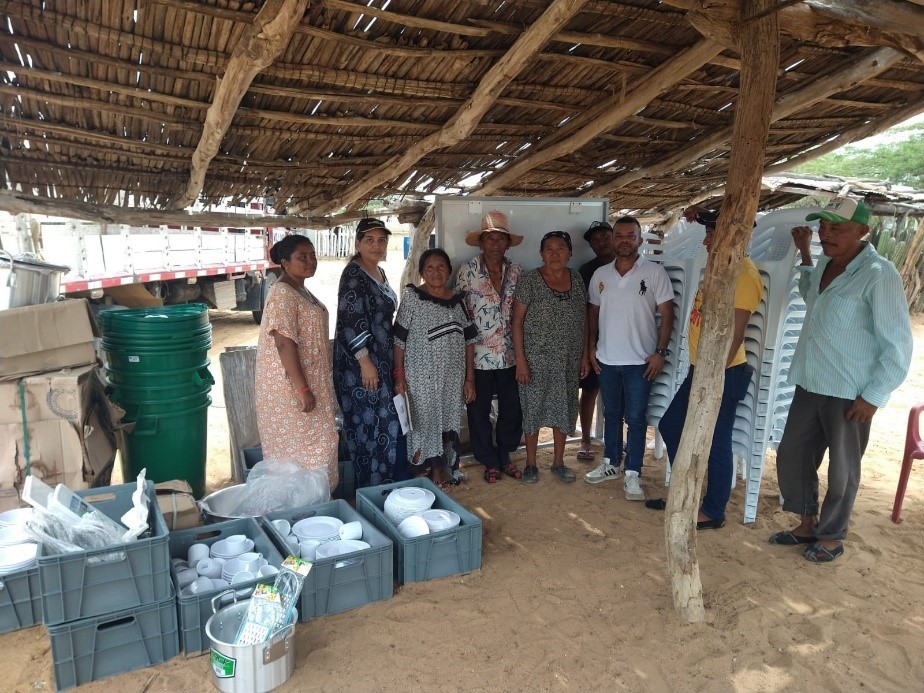
Delivery of voluntary social investment, furniture and kitchenware in the Campo del Mar community, Santa Rosa sector
Prevention and management of intercultural conflicts
To prevent intercultural conflicts, the main actions adopted by Ecopetrol are: i) compliance with environmental legal regulations in the areas where we operate, ii) identification of presence of ethnic groups in the areas to be intervened, their authorities and expectations with the aim of creating dialogue spaces, and iii) conducting prior consultation processes when required.
The main cause of the conflict with ethnic groups is the lack of clear regulations on the application of the prior consultation process, especially in operational areas that existed before the issuance of Law 21 of 1991, norm that embraces Convention 169 of the International Labor Organization - ILO. However, in 2024, this cause decreased. Communities of ethnic groups have requested inclusion of labor and contracting of goods and services. Although Ecopetrol has a diversity and inclusion approach in contracting processes, we generate spaces with the communities in which the mechanisms established in current regulations for participation in processes of both labor and goods and services are clarified.
Other types of conflicts have arisen, associated with requests that ethnic communities make to third parties, nonetheless, since the Company is present in the area, they involve us as actors in the territory. In all cases, Ecopetrol is willing to participate in these spaces to the extent of its responsibility and scope.
Table. Significant conflicts with ethnic communities in 2024
|
CONFLICT START DATE |
COMMUNITY |
PROJECT |
FACTS CLAIMED BY THE COMMUNITY |
ECOPETROL'S POSITION |
STATUS OF THE CONFLICT 2024 |
|
24 June 2024 |
El Chorro and La Legua Community Council |
Casablanca Photovoltaic Solar Project |
On June 24, 2024, the Afro-descendant community council El Chorro y la Legua filed a protection action against DANCP and Ecopetrol S.A, stating that the rights to prior consultation, participation and cultural identity were affected, due to the issuance of Resolution ST – 1592 of October 30, 2023. |
On June 26, 2024, Ecopetrol S.A responds, stating as part of its defense arguments that the activities will be conducted within the intervention area. |
On July 8, 2024, the promiscuous Court of Turbana issued a protection ruling indicating that it found NO evidence of violation of said rights; in this regard, it resolved NOT TO PROTECT the fundamental rights demanded by the council. |
|
11 December 2024 |
Florida Kawinanae Indigenous Reservation |
CPO 08 Block |
They request leaving without effect administrative act No. 2275 of December 13, 2012, Resolution 57 of August 28, 2013, and other issued to modify or supplement them, including Communication with ID: 442866 dated 12-11-2024, and the defendant is ordered to, in a peremptory term, as established by the judge, to restart the administrative procedure for certification of the presence of ethnic communities and origin of the consultation for the CPO-08 South Exploratory Drilling Area project, as well as the seismic prospection project performed in the years 2009 and 2010. The foregoing, based on the process of restitution of collective territories completed in 2023. |
The projects mentioned in the guardianship were duly consulted at the time and are currently closed: The CPO-08 2D Seismic Acquisition project was executed between 2010 and 2011, the CPO 08 South Exploratory Drilling Area (APE) project consisted of the drilling of an exploratory well called Provenza 1 in 2019, which is located outside the titled reservation and is currently in the process of abandonment. The establishment of the reservation took place in 2023 and on such date the projects had already been executed. |
On December 11, 2024, the Second Civil Court of Orality of the Bogotá Circuit issued an order admitting the action for the protection of people's rights (Tutela) presented by the Florida Kawinanae Reservation of the Sikuani people against the Directorate of the National Authority for Prior Consultation of the Ministry of Interior. The Ministry of Interior, Ecopetrol, the Comptroller's Office of the Republic, and the Attorney General's Office of the Nation are linked to the process. One day is given to rule on the facts. |
|
28 August 2024 |
Taganga indigenous community |
Tayrona Exploratory Drilling Area |
The Fourth Labor Court of the Santa Marta Circuit issued an order dated August 28, 2024, whereby it resolves to admit the protection action against Petrobras, among other defendants, for not guaranteeing the right to prior consultation within the framework of the Tayrona Exploratory drilling area project. |
Ecopetrol is a partner and Petrobras is the operator. In the response of the protection action (Tutela), the non-existence of violation of the fundamental right to prior consultation of the indigenous community of Taganga is explained, explaining from the jurisprudence of the constitutional court, because the requirements are not met to determine that there is a direct impact and therefore a prior consultation. |
On September 12, 2024, the Fourth Labor Court of the Santa Marta Circuit issues a first instance ruling, protecting the fundamental rights to prior consultation, due process and the right to intellectual, cultural, and environmental property of Mr. Ariel Daniels de Andreis, who acts as Governor of the Taganga indigenous community. Orders are also issued to various institutions, among which is the need to perform a verification visit.
Through Resolution ST-1686 of December 6, 2024, the DANCP indicates that prior consultation with CABILDO INDIGENA DE TAGANGA is appropriate, for the project: “TAYRONA EXPLOITATION AND DEVELOPMENT AREA”.
Since the direct impact set out in resolution ST - 1686 of 2024 is not clear, on December 20, an appeal for reconsideration was filed by Petrobras. |
Source: Corporate Vice Presidency of Transformation of the Territory and HSE, Dialogue and Relationships Management
Identified cases of violation of human rights of indigenous peoples
In 2024, there were no violations of the human rights of indigenous peoples, black, Afro-Colombian, Raizal and Palenquera communities, or Rom (Gypsy) communities, bearing in mind that in the protection actions related to the Ecopetrol operation, the judges did not identify any violation of human rights claimed by the communities.
Company position relating to hiring local ethnia
The hiring of labor among members of Ethnic Groups is based on respect for the right to non-discrimination based on ethnicity in terms of employment, and it is regulated by the provisions of the Political Constitution of Colombia, in particular, Convention 169 of the International Labor Organization - ILO, which, in its Article 20, sets forth the following:
“Governments shall adopt, within the framework of their national legislation and in cooperation with the peoples concerned, special measures to guarantee the workers belonging to these people’s effective protection as regards hiring and employment conditions, insofar as they are not effectively protected by the legislation applicable to workers in general.”
Despite the Government being in charge of defining an employment policy for ethnic groups, the Company must avoid any negative discrimination among workers belonging to ethnic groups and guarantee that at least the principle of bilingualism is applied and that the cultural differences of each community, and their representative authorities are considered.
As explained previously, mechanisms for listening and disseminating legal processes are sought to facilitate access routes to contracting processes.
Mechanisms for petitions, grievances, and claim for indigenous communities
For each project, the communication and information channels that the community can use to communicate their petitions, grievances and claims are established and disclosed. These channels may include gathering of verbal claims, telephone calls and written reports. This is equally applicable to ethnic communities; nevertheless, when it is determined that the communities require translation, a native speaker is available to gather such claims.
Prior consultations underway, monitoring and closing
Click here to learn about the Procedures for conducting Prior Consultations (GDE-P-008)
The prior consultation is performed to comply with legal and environmental regulations, as well as to seek concerted and informed agreements with indigenous and Afro-Colombian communities, managing the impact of projects that respect the cultural heritage they represent. In Colombia, the Constitutional Court, through Judgment Su-123 of 2018, has established that prior, free, and informed consent is necessary for the execution of projects that involve any of the situations established by the Constitutional Court in these three exceptional cases: i) transfer or relocation of the indigenous or tribal people from their place of settlement; ii) storage or deposit of hazardous or toxic materials in their territories; or iii) measures that imply a high social, cultural, and environmental impact that puts their subsistence at risk.
From the planning of the operations to be conducted, the possible affectation of ethnic groups in the work areas is verified. In case of verifying before the authority a possible direct affectation to the ethnic groups, Ecopetrol accompanies and promotes the guarantee of the right to prior consultation. For the performance of prior consultations, Ecopetrol has an internal procedure in place, based on current regulations and on the analysis of potential project impacts; such guideline is updated periodically, as new guidelines are issued.
In 2024, the following prior consultations are shown according to their stage:
Table. 2024 prior consultation processes
|
Stage |
Project |
Communities |
|
Under planning |
Bioremediation, abandonment and environmental recovery activities Airú 1 Well |
1 |
|
Casablanca Photovoltaic Solar Project |
2 |
|
|
Follow up |
Consultation on repair of Rubiales Field |
1 |
|
Modification of Rubiales Global License |
1 |
|
|
Modification EMP West North Area Polygon |
2 |
|
|
Closure underway |
APE Nafta |
1 |
|
Closed |
Orca-Chuchupa B Gas Flowline |
66 |
|
Samichay A 2D |
4 |
|
|
Total |
8 |
78 |
Source: Corporate Vice Presidency of Transformation of the Territory and HSE, Dialogue and Relationships Management
The communities with which prior consultations are being conducted, are:
Table. Prior consultation processes underway, monitoring, and closure 2024
|
Consulted communities / Location |
Ecopetrol Project |
Progress |
Stage reached in 2024 |
|
Inga Villa Catalina Reservation of Puerto Rosario |
1. Bioremediation, abandonment and environmental recovery activities Airú 1 Well |
Progress is being made in the relationship process with the Villa Catalina Reservation of Puerto Rosario within the framework of the prior consultation for bioremediation, abandonment and environmental recovery activities of the Airú 1 Well. In June and November, spaces for dialogue and understanding were held with the community and institutions within the framework of the abandonment obligation |
Relationships with the community |
|
Zenú de Membrillal – CAIZEM Indigenous Community
Community Council of Black Communities Miriam Makeba de Membrillal |
2. Casablanca Photovoltaic Solar Project |
From November 18 to 22, 2024, approaching meetings were held with both communities, with the purpose of building the methodological route of the consultative process. Progress has been made in the relationship process. |
Approach to ethnic communities |
|
Sijuani Alto Unuma Meta Reservation / Puerto Gaitán (Meta) |
3. Polygon within the Rubiales Field: Consultation conducted in response to the order of the Council of State. |
Consultation made official in 2019, now in monitoring stage. Consultation agreements underway. Follow up meeting held in 2022.
Compliance with the agreements of the consultative process continues. Once completed, a closing meeting will be arranged with the DANCP. |
Follow up |
|
Buenos Aires Community belonging to the Alto Unuma Indigenous Reservation |
4. Modification of Global Environmental License Rubiales Field |
Prior consultation with agreements were made official in 2023. By 2024, progress has been made in the adjustments to the Environmental Impact Study and in the adjustment of the management data sheets. Relationship is maintained with protection. |
Follow up |
|
Camentsá Biya and Cabildo Pasto Orito Siberia (Orito, Putumayo) Indigenous Councils |
5. Development of the Occidente Norte Area |
Prior consultation with agreements made official in 2022. The environmental amendment was obtained. Relationships are maintained with the Pastos Orito Siberia council and the Camentsa Biya de Orito indigenous council. |
Follow up |
|
Embera Chami de Dachidrua / Puerto Parra (Santander) Indigenous Council |
6. Nafta Exploration Drilling Area |
Consultation made official in 2014. Fulfilled consultation agreements. The DANCP was requested to administratively close the consultation process, due to the difficulties of representation within the community. |
Administrative closure request |
|
66 indigenous communities of La Guajira |
7. Orca-Chuchupa B Gas Flowline |
From April to May, the consultative process was closed with the 66 communities with which progress had been made up to the opening stage.
Between January to August 2024, an informative process of the closure was conducted for interested communities that did not require consultation. |
Closed |
|
Buenavista Indigenous Community |
8. Samichay 2D Seismic. |
Consultation made official in 2013. The project will not be executed; therefore, in 2022 the authority was requested to close the prior consultation. The DANCP, through resolution 89 of October 28, 2024, declares the prior consultation process of the project concluded and closed. |
Closed |
Source: Corporate Vice Presidency of Territorial Transformation and HSE, Dialogue and Relationship Management
Participatory baseline construction and impact analysis
Should the authority determine the applicability of the prior consultation for a project, the corporate procedure is activated that implies the direct collection with the consulted ethnic communities of social, environmental, cultural, and cartographic information, and a document named baseline is then consolidated. The participatory construction process of the baseline involves field trips that allow learning about the general characteristics of the communities, identifying places of cultural importance and technically exposing the operational scope of the project.
This primary source data built jointly with the communities allows for:
- Determining and knowing the actual characteristics of each community and, therefore, conducting a particular analysis of potential impacts and proposing proportional, coherent management measures.
- Show the operational scope of the activity in the field. Thus, the communities have technical information on the activities to be conducted, and they can formulate and manage their concerns.
For 2024, no baseline information gathering processes were conducted, because prior consultation processes were not initiated. For the Casablanca – Cartagena Solar Photovoltaic project, and within the framework of the prior consultation process, the approach and pre-consultation began with the Zenú Membrillal-Caizem indigenous community and the Miriam Makeba de Membrillal Community Council of black communities.
Prior Consultations made official
In 2024, no official protocol meetings were held with the DANCP.
Fulfillment of agreements derived from prior consultations
The agreements are binding for Ecopetrol and their compliance is activated in the operational stage of the project. These agreements correspond to management measures to be applied so that the project can be performed while protecting the integrity of the ethnic community. The Directorate of the National Authority for Prior Consultation - DANCP periodically verifies compliance with the agreements in the field. Once the agreements have been fully complied with, the authority verifies and issues a consultation closure act. In the event of deciding to abandon the project, the prior consultations are formally closed, a process that is verified by the DANCP.
In view of the foregoing, in 2024, no official follow-up meetings were held with DANCP; the relationship with ethnic communities was maintained. It was NOT necessary to undertake compliance actions given that the projects related to the prior consultations already made official have not come into effect.
Prior Consultation Process Closing
- Orca-Chuchupa B Gas Flowline
Between April 18 and May 29, 2024, the closing strategy of 66 prior consultation processes for the Orca Chuchupa B Gas Flow Line project was conducted, with the indigenous communities with which the process had been opened, located in the municipalities of Riohacha, Manaure and Uribia. 66 meetings were held, where the following topics were reported:
-
Description of the project that was being consulted
-
Summary of the activities conducted during the prior consultation process
-
Presentation of the technical reasons that motivated the closure of the project and, therefore, of the prior consultation process
-
Explanation of the activities performed by the company to close the prior consultation.
The closure of the consultative process was performed due to early closure of the project. The communities with which the closure was performed are listed below:
|
Community |
Closing Date |
Community |
Closing Date |
Community |
Closing Date |
|
Alemasain |
3/05/2024 |
Jerusalén |
25/04/2024 |
Picamana |
29/04/2024 |
|
Alitachon |
24/04/2024 |
Julekat 1 |
30/04/2024 |
Piedras Blancas |
26/04/2024 |
|
Alouliakat |
22/04/2024 |
Jululuwain |
10/05/2024 |
Piruwaitamana |
18/04/2024 |
|
Ampuita |
10/05/2024 |
Juluwaipa |
10/05/2024 |
Piulakat |
07/05/2024 |
|
Atunatchon |
29/04/2024 |
Kalinasira |
30/04/2024 |
Poportin |
02/04/2024 |
|
Belén |
24/04/2024 |
Karalapana |
10/05/2024 |
Popoya Loma |
19/04/2024 |
|
Cachaca 2 |
23/05/2024 |
Kasulepo |
09/05/2024 |
Puente Guerrero |
16/05/2024 |
|
Cachaca Playa |
27/04/2024 |
Kousepo |
03/05/2024 |
Puerto Caracol |
27/04/2024 |
|
Calabacito |
24/04/2024 |
Kousharipa |
29/04/2024 |
Puerto Nuevo |
20/04/2024 |
|
Campo del Mar |
24/04/2024 |
Kulalitamana |
30/04/2024 |
RI Las Delicias |
23/05/2024 |
|
Cangrejito |
18/04/2024 |
Kushkat |
23/04/2024 |
Riohachamana |
23/04/2024 |
|
Carranza |
10/05/2024 |
La Raya |
18/04/2024 |
Salamina |
25/04/2024 |
|
Castillo |
22/04/2024 |
Macolla |
20/04/2024 |
San Tropel |
23/04/2024 |
|
Chimaru |
29/04/2024 |
Macolla 1 |
27/04/2024 |
Saralapaz |
06/05/2024 |
|
Chuchupa |
24/04/2024 |
Malouyen |
02/05/2024 |
Sucurapo |
03/05/2024 |
|
Ciruelakat |
06/05/2024 |
Mapua |
25/04/2024 |
Tamaliap |
22/04/2024 |
|
Cojemana |
10/05/2024 |
Mayapo |
19/04/2024 |
Tapua |
09/05/2024 |
|
El Ahumado |
20/04/2024 |
Molino |
07/05/2024 |
Tolinchikat |
06/05/2024 |
|
El Colorado |
29/05/2024 |
Musichi |
26/04/2024 |
Uriakat 1 |
09/05/2024 |
|
Erapu La Raya |
18/04/2024 |
Neima |
25/04/2024 |
Villa Luz |
09/05/2024 |
|
Garciamana |
03/05/2024 |
Pancho |
02/05/2024 |
Walermana |
22/04/2024 |
|
Ichikepo |
23/04/2024 |
Perrakat |
06/05/2024 |
Yamulikamana |
26/04/2024 |
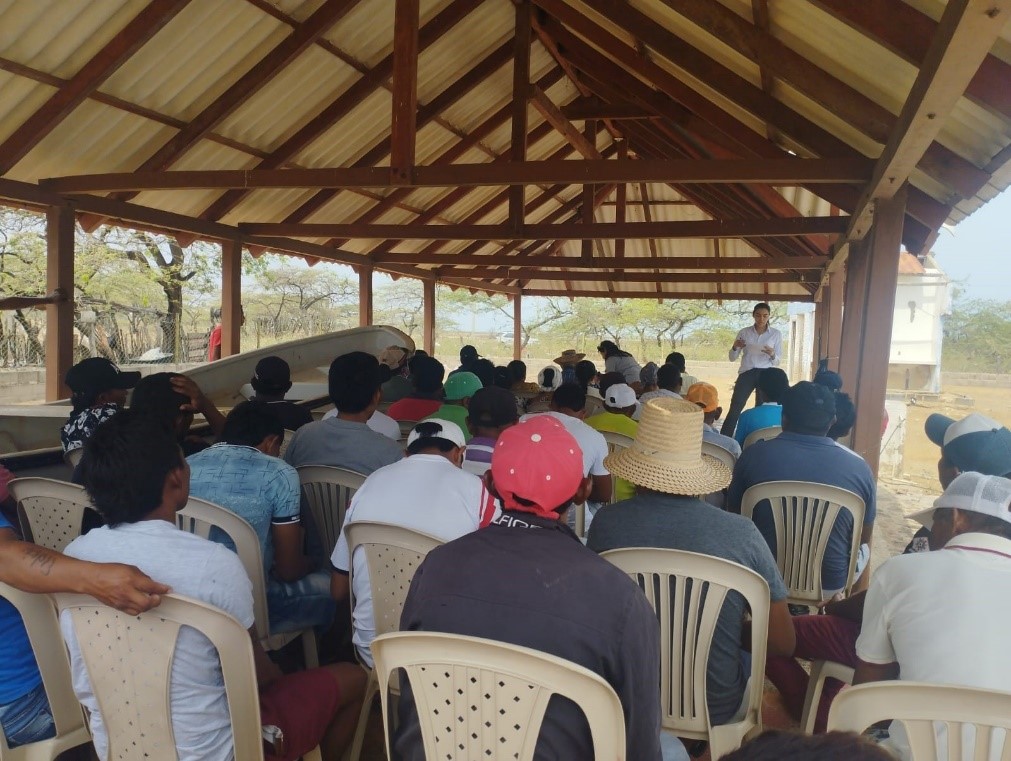
Closing meeting for the Orca Chuchupa B Gas Flow Line project with the Mayapo community, April 19, 2024
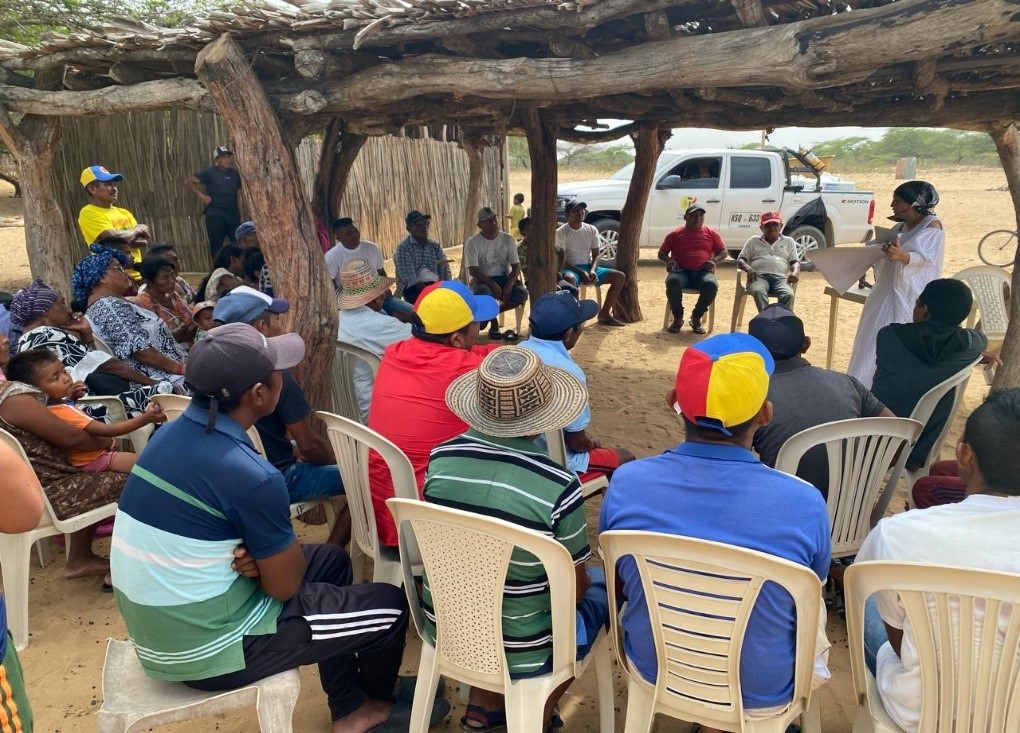
Closing meeting for the Orca Chuchupa B Gas Flow Line project with the Kushkat community, April 23, 2024
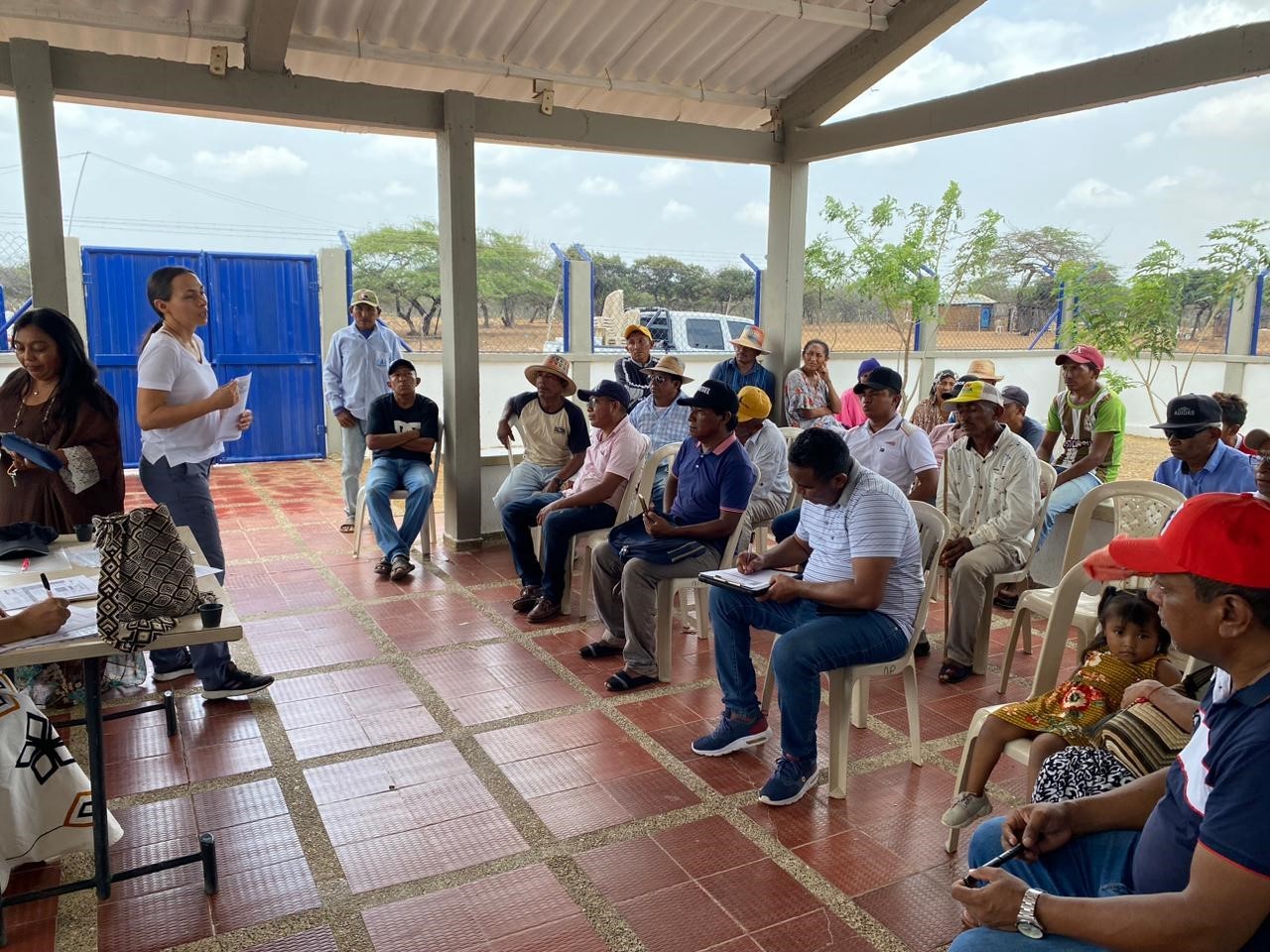
Closing meeting for the Orca Chuchupa B Gas Flow Line project with the Villa Luz, Uriakat 1, Tapua and Casurepo communities, May 9, 2024
On September 27, 2024, a report containing the 66 closing meetings of the consultative process was sent to the DANCP, with the purpose of advancing the administrative closure of the project file.
- Samichay A 2D
In 2013, Ecopetrol S.A conducted the prior consultation process with the Jericó Consaya Reservation, community of Buenavista, Teófila Reservation and Coropoya Reservation, under the coordination of the Prior Consultation Directorate of the Ministry of Interior, for the Samichay A 2D seismic project. Once the prior consultation was performed, the necessary work was carried out to start execution of the project; however, this was not possible due to public order situations. Hence, on July 28, 2022, Ecopetrol requests the DANCP to administratively close the prior consultation due to withdrawal from the project.
The DANCP verified that there was no pending issue with the communities, and on October 29, 2024, it officially issues Resolution No. 89 of 2024 whereby it accepts the express withdrawal and, consequently, the prior consultation process is declared concluded, ordering the closure of the process.
The following is a map of Ecopetrol's operations, its infrastructure and exploratory blocks, which shows the existence of Indigenous Reservations and lands titled to Community Councils. It is clarified that there is no database that establishes the location of communities that do not have legally constituted land, as the definition of territorial limits must be legalized by the Colombian State. Therefore, each time an activity is planned for a new area, the respective resolution of prior consultation must be requested from the Ministry of Interior, and the Ministry evaluates whether a verification visit to the area is required or it issues the administrative act based on its historical of their databases.
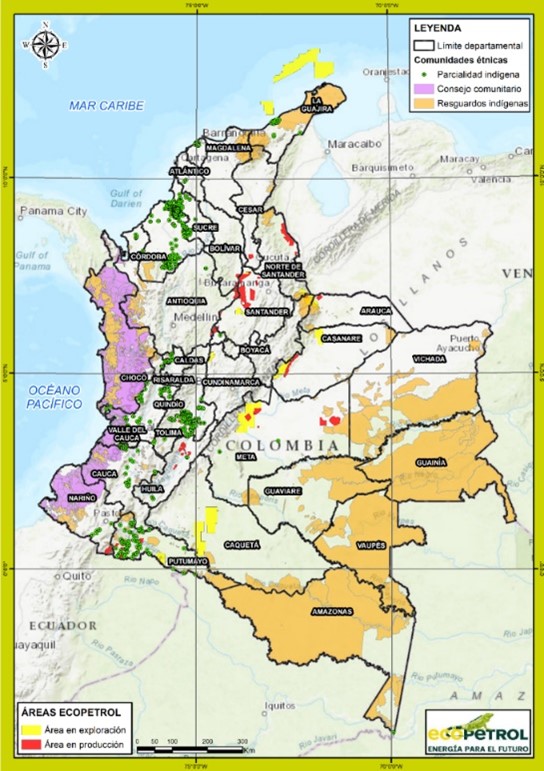
Operations in sites with the presence of ethnic communities or in adjacent areas
Department of La Guajira: The Chuchupa and Ballenas fields, operated by Hocol, a subsidiary of Ecopetrol, are located therein, as well as offshore blocks that are evaluating operational viability.
Department of Bolivar: The Cartagena Refinery and the Néstor Pineda Maritime Terminal are located in the Mamonal Industrial District in Cartagena. Although there are no ethnic groups in the Industrial District, Community Councils and Zenú Councils have been established in adjacent areas.
Department of Norte de Santander: Production fields are operated near the Motilón Barí communities.
Departments of Santander, Boyacá and Arauca: The U'wa Peopled are located in these departments, close to the operations of the Gibraltar field and its facilities. Several community councils of black communities have been organized in recent years.
In Santander, Embera councils have been organized, which state that they have had settlements in Puerto Parra, Cimitarra, Puerto Berrio and Puerto Boyacá for over forty years.
Department of Meta: Neighboring the Rubiales and Campo Mago fields, operated by Ecopetrol, there are the El Tigre and Alto Unuma Reservations. Likewise, the settlements of Sikuani communities have been consolidated and are currently discussing with the national government to define their registration and territorial rights.
Department of Putumayo. It has received several ethnic groups that have arrived, either through colonization processes, or displaced by situations of violence. In recent years, these communities have requested registration from the Ministry of Interior, which leads to their recognition. Thus, in Putumayo there are councils of the Embera, Nasa, Awá, Pasto, Kichwa, Pijao and Muruy peoples. Community councils have also been formed. The Camentsá and Inga communities originate from the upper Putumayo, and the Siona and Cofán communities from the lower Putumayo.
Department of Nariño: The Sucumbíos Field is located in the municipality of Ipiales, in which there is presence of the Pasto, Awá, Nasa and Cofán indigenous people, as well as Community Councils. There is also the Trasandino pipeline, on which there are Awá , Pasto communities, and Community Councils.
Ethnic strengthening program: Training on Diversity
It is a virtual (via WhatsApp) and face-to-face training program, which allows strengthening the individual, group, organizational and community capacities of ethnic groups in Ecopetrol's areas of interest. Also, it serves as a means to maintain permanent, direct dialogue with these stakeholders.
It is aimed at community bases and by 2024 we have registered 650 Wayuu people from the municipality of Manaure, and 281 people from the Pasto, Inga and Siona ethnic groups in Putumayo. The initiative is underway and will last until late December. It includes the following modules: Recognizing my Culture, Political and Organizational Awareness, Our Territories, Own Governments, Project Formulation, and Energy Transition.
Dialogue with the U'wa People
In 2024, Ecopetrol maintained the relationship with the new Board of Directors of Asou'wa for the period (2022 - 2025), seeking to provide continuity to the intercultural dialogue. Although Ecopetrol is interested in maintaining dialogue with the U'wa community, this year the dialogue has been conducted mainly between the National Government and the community, in furtherance of government compliance actions. Ecopetrol has been supporting logistics activities for these spaces.
The construction of the Thinking Center in the United U'wa Reservation continues. This project agreed upon with the community is intended to have a place that enables strengthening governance and cultural activities. Furthermore, it will be able to provide services for the population that is in transit to the municipal seat.
In December, the Inter-American Court of Human Rights issued a ruling in the case of the U'wa Indigenous People vs. Colombia. The State is declared liable for the violation of human rights and is ordered to: implement the necessary measures for the comprehensive sanitation of the U'wa and Kuita reservations, clarify the colonial titles, conduct a participation process for current extractive processes, guarantee that the projects located within the reservation or adjacent will not cause impacts , and adopt measures to mitigate the environmental damage derived from the blasting of the Caño Limón Coveñas oil pipeline, among other measures. Ecopetrol maintains monitoring of the Government's response to the ruling.
Intercultural dialogue with the Alto Unuma Meta indigenous reservation
Dialogue and consensus with the Alto Unuma (Meta) reservation of the Sikuani ethnic group, adjacent to the Rubiales field, made it possible to consolidate spaces where respect for cultural differences and indigenous self-government prevail. In 2024, the traditional Ethno-cultural Meeting of the Alto Unuma Meta - Yalaki Reservation was held with the aim of strengthening knowledge of the cultural identity of the Sikuani people of the Alto Unuma Meta reservation and the respectful interaction between cultures that recognize themselves as different and find a common language to communicate, highlighting respect and appreciation for difference and peaceful coexistence. Similarly, the Guard of the Reservation was strengthened through provision of vests and uniforms to improve their visibility in the dialogue spaces.
Engagement activities with ethnic communities
Ecopetrol's engagement with the ethnic communities close to the operation is supported through the dialogue that allows us to uphold permanent information on the operations. This has also led to consolidating investment projects in territories where the ethnic population coexists with the peasant population.
Strengthening traditional expressions through cultural, social and environmental innovation of the ethnic communities of the department of Putumayo and Nariño
For the year 2024, the initiative called “Support for the rescue of intercultural expressions of ethnic and non-ethnic communities in the departments of Putumayo and Nariño, operational areas of Ecopetrol S.A” was approved. The initiative is framed in the strengthening of the territory and cultural traditions and foresees the creation of 22 spaces, 10 with indigenous communities of Putumayo and Nariño, including support for the traditional festivals of the different indigenous peoples of the department such as Inti Raymi. Priority was also given to the dialogue process called “Intercultural Dialogue to strengthen ties of fraternity with the Organization of the Permanent Worktable of the Cofán People – AMPII CANKE, around the recognition, safeguarding and promotion of living memory, in the departments of Putumayo and Nariño, called: “El Despertar del Jaguar.”( The Awakening of the Jaguar). ()
Commemoration of the international day of indigenous peoples
In August 2024, within the framework of the commemoration of indigenous peoples, promotional actions were performed showing the importance of ethnic and cultural diversity in the performance of the company's activities.
Likewise, on August 9, 2024, a discussion was held with the participation of indigenous women from the Wayuu and Pastos people, who highlighted the importance of this commemoration for the recognition of indigenous peoples in the country's identity and culture.
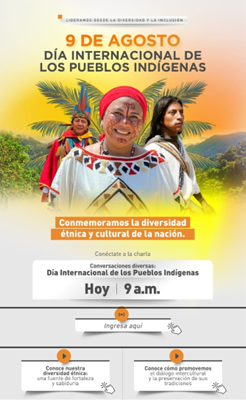
Promotional Discussion on Indigenous Peoples' Day
Agreement for the sponsorship of artisans from ethnic groups within the framework of Expoartesano and Expoartesanias
Expoartesano Miami 2024
Second version of this international fair, which for three days sought to display the work of artisans from the 32 departments. Ecopetrol S.A. provided resources to cover the attendance of 3 artisans at the event, from Sampués (Sucre), Riohacha (Guajira) and Sandoná (Nariño).
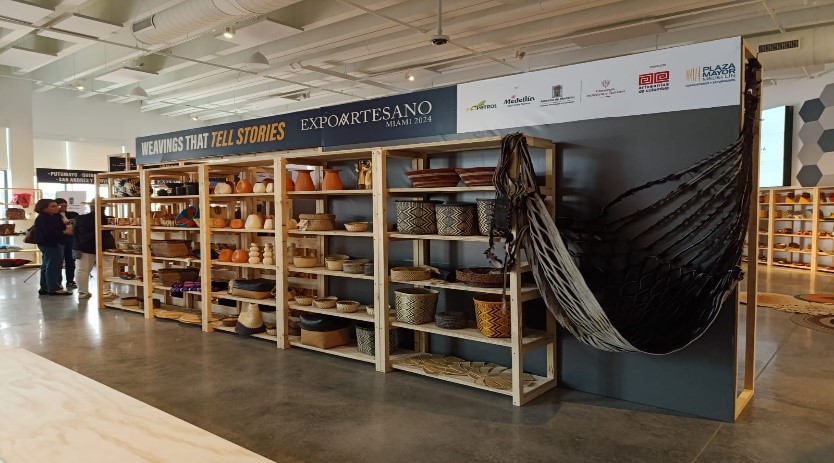
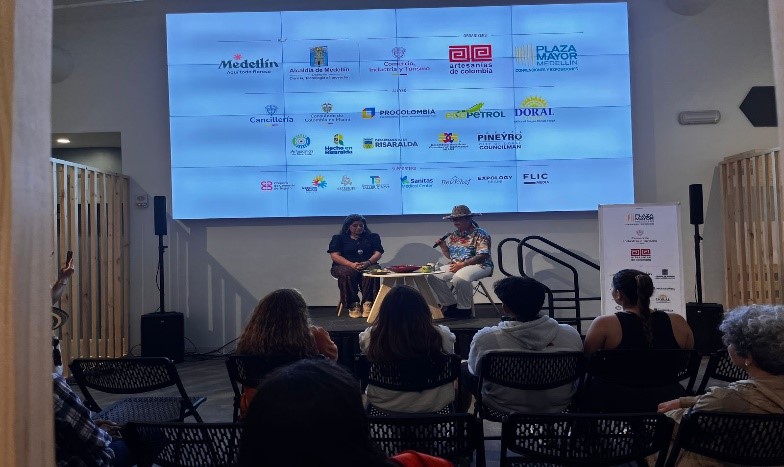
The fair allowed artisans to connect with new markets and thus promote and exalt the traditions and customs of the country's ethnic communities. As a result, the artisans were able to position their products internationally, as well as obtain resources from the sales made.
Expoartesano Medellín Fair
Since 2022, the participation of 5 artisans from ethnic groups has been supported to attend this Fair. These artisans are prioritized based on the selection made by Artesanías de Colombia. In 2024, 2 Wayuu women, 2 artisans from Alto Putumayo and 1 Afro-Colombian artisan were supported, guaranteeing the logistics for their participation and permanence in the fair.
Expoartesanías Fair, Bogotá
Since 2014, the ethnic pavilion of this Fair has been sponsored with a contribution to the artisans of 50% of the cost of renting and assembling the stand, plus their daily lunch. Annually, between 120 and 135 artisans belonging to ethnic communities throughout the country have been supported. For this fair, Artesanías de Colombia, the entity organizing the event, makes a national call and a selection based on its technical criteria. In 2024, 124 artisans from all over the country are participating.
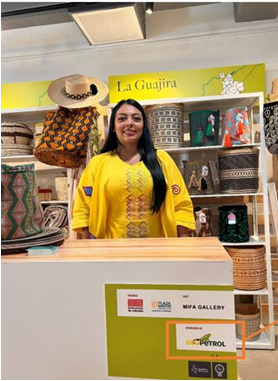
Artisans participation
Archaeology
According to the Political Constitution of Colombia, the archaeological heritage is non-seizable, imprescriptible and inalienable and the Colombian Institute of Anthropology and History - ICANH, is the competent authority in the national territory on matters of said special protection regime (General Culture Law 397 of 1997). These regulatory requirements (Law 397 of 1997, Law 1185 of 2008 and Decree 138 of 2019) include preventive archeology programs. In that sense, maintaining the commitment to current regulations in relation with the protection of the archaeological heritage of the Nation, Ecopetrol S.A has developed different Preventive Archeology Programs (PAP) before the Colombian Institute of Anthropology and History - ICANH in its different regions, intended to safeguard the possible archaeological heritage existing while conducting its activities.
In 2024, preventive archaeological activities were performed as part of 35 archeology programs, situated mostly in the Orinoquía, Andina Oriente, and Central regions, which concentrate the largest number of interventions nationwide. Among the activities performed in 2024, it is worth highlighting the formal closure before ICANH of 1 preventive archeology program pursuant to decree 138 of 2019, in operational and exploration zones corresponding to the Tayrona Orca project (Resolution 1600), and 2 in the process of closure such as the YUMA Project (Resolution 1066) and Metropolitan Aqueduct of Cúcuta (Resolution 751).
During the archaeological activities performed as part of the prospecting and approval phase of the Archaeological Management Plan (PMArq), 191 archaeological management plans were approved in specific polygons that focused especially on the following Ecopetrol preventive archeology programs: 50K field (Resolution 1050) with 105 approved PMArq; Cubarral Block (Resolution 631) with 4 approved PMArq; Campo Rubiales (Resolution 258) with 24 approved PMArq; Campos Huila Norte, Tello, Rio Ceibas (Resolution 868) with 57 PMArq approved; ERNC Ecopark Casablanca – Membrillal (Resolution 0136) with 1 approved PMArq.
On the other hand, during the implementation phase of archaeological management plans, 35 specific polygons were closed, which were especially focused on the following Ecopetrol preventive archeology programs: Tayrona Orca (Resolution 1600) with 1 PMArq closed; 50K field (Resolution 1050) with 2 PMArq closed; Cubarral Block (Resolution 631) with 20 PMArq closed; Campo Casabe and Peñas Blancas (Resolution 112) with 10 PMArq closed; MARES (Resolution 667) with 2 PMArq closed. In the process of closing: the case of Campo Rubiales (Resolution 258) 46 PMArq; Metropolitan Aqueduct of Cúcuta (Resolution 751) 1 PMArq, and YUMA road project (Resolution 1066) 4 PMArq.
Furthermore, authorizations for archaeological intervention at the plant were closed for the Machín well (AIA 8751), Llanito Locations (AIA 8261), and are under evaluation and response by ICANH: Llanito (AIA 8247) and specific projects Cubarral Block (AIA 6490).
In the framework of the aforementioned preventive archeology programs, archaeological material was also reported in the Orinoquía region, specifically in the municipalities of Acacias, Castilla and Guamal for the GDT SECONDARY INTEGRAL DEVELOPMENT MODULE project. During the construction of the 24” EA1-EC3 Transfer Line and in development of the Cubarral Block Preventive Archeology Program (Resolution 631 of 2020), prospecting, intensive prospecting, monitoring and archaeological excavation activities were carried out (13), in which during the months of July, August and September findings of archaeological material corresponding to more than 4000 fragments of ceramic material and 350 lithic artifacts were identified. These findings were presented in the El Triunfo village in the municipality of Acacias (Meta) in the specific polygons MODULO INTEGRAL 14 (R6312086) and MODULO INTEGRAL 4457-1 (R63120177). In Field 50K (Resolution 1050 of 2020), during the construction of tower E11, two points with archaeological findings were identified, in post 3 at a depth of 60 cm, a possible lithic artifact was found, and in post 9 at a depth of 30 cm an accumulation consisting of 39 ceramic fragments and 3 lithic artifacts was found. Regarding the latter, intensified activities were performed, which determined the creation of an archaeological section of 2x1 m2 at the point of discovery.
In the case of the Andina Oriente regional, in the municipalities of Neiva and Puerto Gaitán, within the framework of the archaeological sampling required for the implementation of the PMArq of the Production and Injection Trunk polygon to be intervened by the Dina Terciarios – Palogrande Comprehensive Development project (Resolution 868 of 2021); during the excavation of a survey, ceramic fragments were recovered, the analysis of which led to the reconstruction of a piece classified as a vessel whose shape and style classification allowed it to be identified as Río Negro ceramics, corresponding to a recent period (1650 AD to the present). In turn, in the Rubiales Field (Resolution 258 of 2020) in August 2024, the archaeological discovery of ceramic material that occurred in the Rubiales rural district of Puerto Gaitán was reported, during the civil works carried out in the DIR project. In this case, the fragments of material were collected and the methodology approved by ICANH of the findings protocol during archaeological monitoring was initiated. As part of these actions and added to what was collected in the two days, it was established that there were 145 fragments of ceramic material. In this regard, understanding meetings have been held with the Alto Unuma reservation, ICANH and the Ministry of Interior to provide pertinent information and establish subsequent steps.
For the Central region, in the municipality of Barrancabermeja, during the Implementation of the Archaeological Management Plan approved for the specific polygons that are part of the Preventive Archeology Program of the YUMA road project (Resolution 1066 of 2021), 343 lithic archaeological assets were identified during monitoring activities through surface collection. In the material cores, flakes, carving waste, flakes with traces of use, mortars reused as cores and a possible fishing weight were identified. As for raw material, yellow and gray chert was identified, as well as some very expeditious quartzite choppers.
Another activity performed as part of Ecopetrol's preventive archeology programs corresponds to the management of cultural assets of the Nation, registered in the different projects conducted in the regional districts. In this regard, regional institutions have been approached to make official officialize the possession of the reported archaeological material. Taking this as a starting point, contact has been made with the cultural houses of the Mayor's Office of Acacías, Mayor's Office of Aipe, Ecobiblioteca de Castilla, Ecocentro de Guamal, History Academy of Norte de Santander, Mayor's Office of Orito, Mayor's Office of Barrancabermeja, museum network of the department of Casanare, Escuela Normal Superior de Acacías, Regional Archaeological Museum of the Departmental Secretariat of Culture of Huila, among others, seeking to ensure the good conservation and preservation of the archaeological elements reported in the different projects carried out by Ecopetrol throughout Colombia. Finally, it is worth mentioning that during the phases of prospection, archaeological management and implementation of the archaeological management plan, public archeology activities such as talks and workshops were procided, which seek to raise awareness among project personnel, the local population and the administrative entities of the municipalities regarding the importance of protecting archaeological heritage and current regulations for its protection.